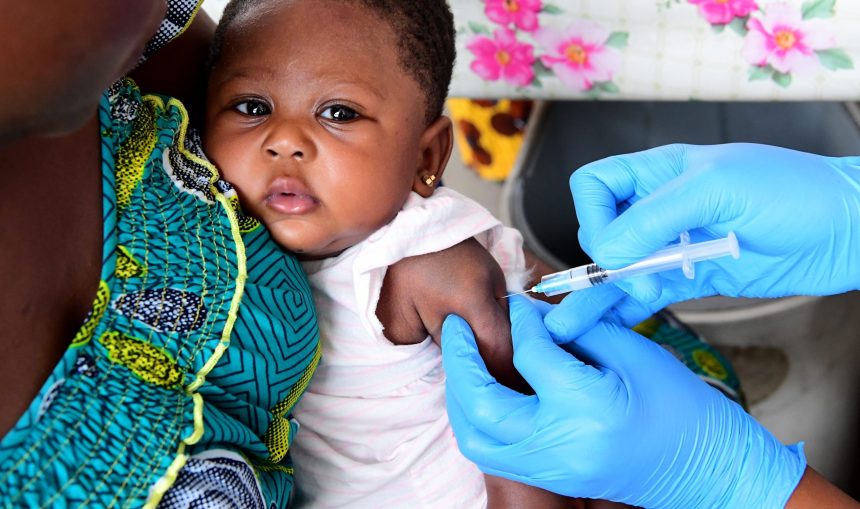14.3 million infants remain unvaccinated in 2024 and missed out on vaccination; that is 4 million more than the 2024 target needed to stay on track with Immunisation Agenda 2030 goals and 1.4 million more than in 2019, the baseline year for measuring progress.
The World Health Organisation/UNICEF, in new national immunisation coverage data released on Monday, said nearly 20 million infants missed at least one dose of a DTP-containing vaccine last year, including 14.3 million “zero-dose” children who never received a single dose of any vaccine.
According to the release, in 2024, 89% of infants globally, approximately 115 million, received at least one dose of the diphtheria, tetanus, and pertussis (DTP)-containing vaccine, and 85%, roughly 109 million, completed all three doses.
In addition, compared to 2023, around 171,000 more children received at least one vaccine, and one million more completed the full three-dose DTP series, which signals a modest gain made by countries working to protect children, even amid growing challenges.
WHO Director-General, Dr Tedros Adhanom Ghebreyesus, in a remark, said it is encouraging to see a continued increase in the number of children being vaccinated, although we still have a lot of work to do.
He said, “Drastic cuts in aid, coupled with misinformation about the safety of vaccines, threaten to unwind decades of progress. WHO remains committed to working with our partners to support countries to develop local solutions and increase domestic investment to reach all children with the lifesaving power of vaccines.”
In a remark, UNICEF Executive Director, Catherine Russell declared that more children were reached in 2024 than the previous year, a sign of determination and progress, but shrinking health budgets, fragile health systems, rising conflict, and the spread of misinformation are warning signs of a potential backslide.
He declared, “Times are changing, and we must act now to protect millions of children from diseases we know how to prevent.”
WHO and UNICEF, however, called on governments and relevant partners to close the funding gap for Gavi’s next strategic cycle (2026–2030) to protect millions of children in lower-income countries and global health security and strengthen immunisation in conflict and fragile settings to reach more zero-dose children and prevent deadly disease outbreaks.
They also suggested prioritising local-led strategies and domestic investment, embedding immunisation firmly within primary healthcare systems to close equity gaps; countering misinformation and further increasing vaccine uptake through evidence-based approaches; and investing in stronger data and disease surveillance systems to guide high-impact immunisation programmes.
Data from 195 countries show that 131 countries have consistently reached at least 90% of children with the first dose of the DTP vaccine since 2019, but there has been no significant movement in expanding this group.
Among the countries that reached less than 90% in 2019, only 17 managed to increase their coverage rates in the past five years. Meanwhile, in 47 countries, progress is stalling or worsening. This includes 22 countries that achieved and surpassed the 90% target in 2019 but have since declined.
The data shows that conflict and humanitarian crises can quickly erode vaccination progress. A quarter of the world’s infants live in just 26 countries affected by fragility, conflict, or humanitarian crises, yet they make up half of all unvaccinated children globally.
Concurrently, in half of these countries, the number of infants unvaccinated has expanded rapidly from 3.6 million in 2019 to 5.4 million in 2024, underscoring the need for humanitarian responses to include immunisation.
Coverage against measles also improved, with 84% of children receiving the first dose and 76% receiving the second dose, which shows a slight increase from the previous year. An estimated 2 million more children were reached in 2024, but the overall coverage rate is far below the 95% needed in every community to prevent outbreaks.
This results in more than 30 million children remaining under-protected against measles, leading to larger or disruptive outbreaks. In 2024, the number of countries experiencing large or disruptive measles outbreaks rose sharply to 60, nearly doubling from 33 in 2022.
ALSO READ TOP STORIES FROM NIGERIAN TRIBUNE
WATCH TOP VIDEOS FROM NIGERIAN TRIBUNE TV
- Let’s Talk About SELF-AWARENESS
- Is Your Confidence Mistaken for Pride? Let’s talk about it
- Is Etiquette About Perfection…Or Just Not Being Rude?
- Top Psychologist Reveal 3 Signs You’re Struggling With Imposter Syndrome
- Do You Pick Up Work-Related Calls at Midnight or Never? Let’s Talk About Boundaries







